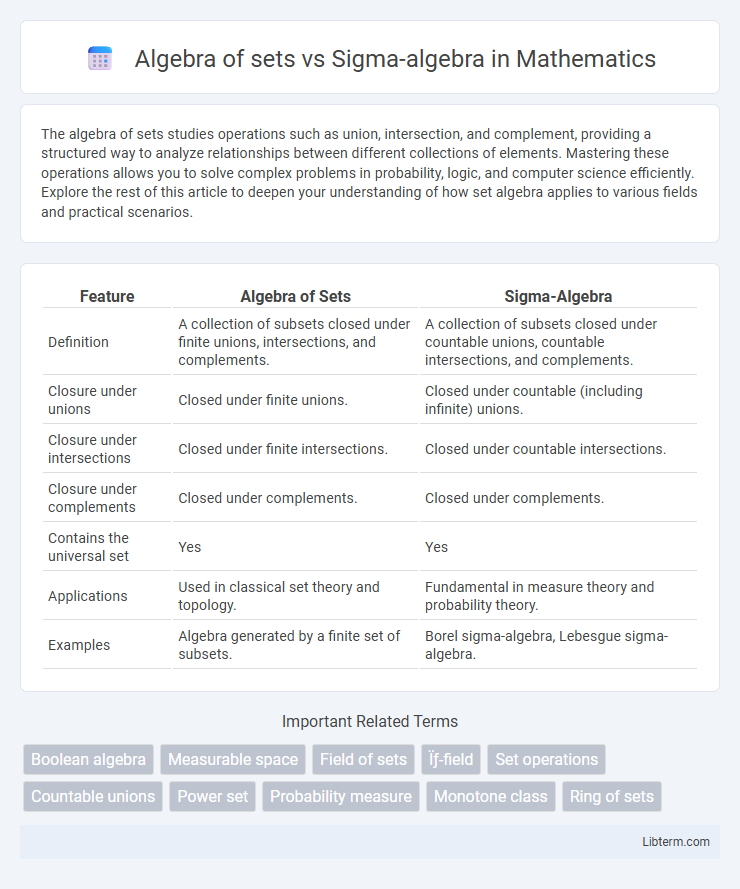The algebra of sets studies operations such as union, intersection, and complement, providing a structured way to analyze relationships between different collections of elements. Mastering these operations allows you to solve complex problems in probability, logic, and computer science efficiently. Explore the rest of this article to deepen your understanding of how set algebra applies to various fields and practical scenarios.
Table of Comparison
| Feature | Algebra of Sets | Sigma-Algebra |
|---|---|---|
| Definition | A collection of subsets closed under finite unions, intersections, and complements. | A collection of subsets closed under countable unions, countable intersections, and complements. |
| Closure under unions | Closed under finite unions. | Closed under countable (including infinite) unions. |
| Closure under intersections | Closed under finite intersections. | Closed under countable intersections. |
| Closure under complements | Closed under complements. | Closed under complements. |
| Contains the universal set | Yes | Yes |
| Applications | Used in classical set theory and topology. | Fundamental in measure theory and probability theory. |
| Examples | Algebra generated by a finite set of subsets. | Borel sigma-algebra, Lebesgue sigma-algebra. |
Introduction to Set Algebras and Sigma-Algebras
Set algebras are collections of subsets closed under finite unions and complements, forming a foundational framework for measure theory and probability. Sigma-algebras extend set algebras by including closure under countable unions, enabling more comprehensive treatment of infinite sample spaces. The distinction between finite and countable operations is crucial for defining measurable spaces and integrating functions over these spaces.
Fundamental Concepts: Sets, Operations, and Collections
Algebra of sets involves collections of subsets closed under finite unions, intersections, and complements, enabling manipulation through basic set operations. Sigma-algebra extends this structure by requiring closure under countable unions and complements, crucial for defining measurable spaces in probability theory. Both concepts rely on fundamental set operations but differ in the scope of closure properties essential for advanced measure-theoretic applications.
Defining an Algebra of Sets
An algebra of sets is a collection of subsets closed under finite unions, intersections, and complements relative to a fixed universal set, ensuring closure without requiring countable operations. In contrast, a sigma-algebra extends these properties by including closure under countable unions and intersections, making it essential for measure theory and probability. Defining an algebra of sets involves specifying a nonempty family of subsets that contains the universal set and is stable under finite set operations, forming the foundational structure for measurable spaces.
Sigma-Algebra: Core Definition and Properties
Sigma-algebra is a collection of subsets of a given set that is closed under complement and countable unions, forming a fundamental structure in measure theory. It includes the empty set and ensures that if a sequence of sets belongs to the sigma-algebra, then their union also belongs to it, enabling the definition of measures. Distinct from algebra of sets, which only requires closure under finite unions, sigma-algebra's countable closure property is essential for probability and integration frameworks.
Closure Properties: Algebra of Sets vs Sigma-Algebra
An algebra of sets is closed under finite unions and complements, ensuring operations on a limited number of sets remain within the algebra. A sigma-algebra extends this closure to countable unions and intersections, providing a stronger structure essential for measure theory and probability. This closure property difference makes sigma-algebras suitable for handling infinite collections of sets in advanced mathematical frameworks.
Differences in Set Operations Allowed
An algebra of sets is closed under finite unions, finite intersections, and complements, allowing manipulation of a limited number of sets at a time. A sigma-algebra extends this closure property to countable unions and countable intersections, enabling analysis of infinite collections of sets. The sigma-algebra's ability to handle countable operations is crucial in measure theory and probability, where limits and infinite processes frequently occur.
Examples: Algebra of Sets vs Sigma-Algebra in Practice
Algebra of sets includes collections like finite unions and intersections of subsets, such as intervals on the real line forming an algebra but not closed under countable unions, for example, finite unions of finite intervals. Sigma-algebras extend this concept by being closed under countable unions and complements, crucial for measure theory, exemplified by the Borel sigma-algebra generated from all open intervals of real numbers. In practice, finite event spaces form algebras, while infinite or continuous sample spaces require sigma-algebras to properly define probability measures.
Applications in Probability and Measure Theory
Algebra of sets forms the foundation for constructing collections of events in probability by ensuring closure under finite unions, intersections, and complements, which supports basic event operations. Sigma-algebra extends this framework by requiring closure under countable unions and intersections, enabling the rigorous definition of measures and probability spaces essential for handling infinite processes and random variables. This distinction allows sigma-algebras to serve as the backbone for Lebesgue measure and probability measures, facilitating integration and limit theorems critical in advanced measure theory and probability applications.
Advantages and Limitations of Each Structure
Algebra of sets allows finite operations like unions, intersections, and complements, making it suitable for basic set manipulations and simplifying proofs in discrete contexts. Sigma-algebra extends this by permitting countable operations, enabling rigorous measure theory and probability applications where infinite processes are essential. While algebra of sets is limited by its finite closure and cannot handle infinite constructions, sigma-algebra's closure under countable unions and intersections comes with increased complexity and stricter requirements that may be unnecessary in simpler frameworks.
Summary: Choosing Between Algebra of Sets and Sigma-Algebra
Algebra of sets is a collection closed under finite unions and complements, suitable for basic set operations often used in probability with finite samples. Sigma-algebra extends this by requiring closure under countable unions, making it essential for measure theory and handling infinite-dimensional spaces. Choosing between them depends on the context: use algebra of sets for finite or simpler structures, and sigma-algebra for rigorous analysis involving infinite sequences or measure-based applications.
Algebra of sets Infographic

 libterm.com
libterm.com